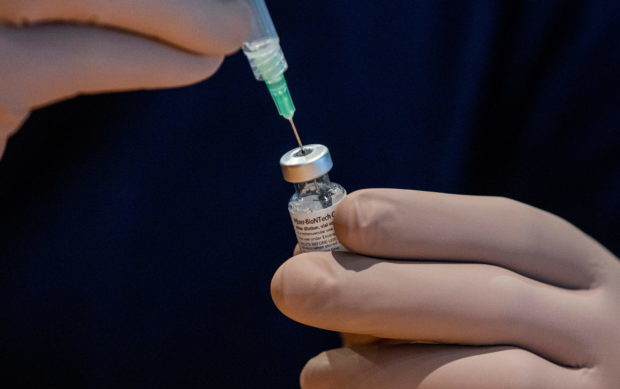Countries weigh ‘mix and match’ COVID-19 shots

FILE PHOTO: A healthcare worker prepares a dose of the Pfizer/BioNTech coronavirus disease (COVID-19) vaccine, which was authorized by Canada to be used for children aged 12 to 15, at Woodbine Racetrack pop-up vaccine clinic in Toronto, Ontario, Canada May 5, 2021. REUTERS/Carlos Osorio
A growing number of countries are looking at switching to different COVID-19 vaccines for second doses amid supply delays and safety concerns that have slowed their vaccination campaigns. Several medical studies to test the efficacy of switching COVID-19 vaccines are underway. The following are countries that are weighing, or have decided to adopt, such a solution:
CANADA
* Officials said in May that people who were inoculated with AstraZeneca’s COVID-19 shot may be offered a second dose of another vaccine, a move based on supply concerns as well as the rise in incidence of rare blood clots linked to first doses produced by the Anglo-Swedish drugmaker.
CHINA
* Chinese researchers in April were testing the mixing of COVID-19 vaccine doses developed by CanSino Biologics and a unit of Chongqing Zhifei Biological Products , according to clinical trial registration data.
Article continues after this advertisement* China’s top disease control official said on April 12 the country was “formally considering” mixing Covid-19 vaccine doses developed with different technologies to boost their efficacy.
Article continues after this advertisementFINLAND
* Finland’s Institute of Health and Welfare said on April 14 that recipients of a first dose of AstraZeneca’s vaccine who are aged under 65 may get a different shot for their second dose, as authorities warned about delays to the country’s rollout.
FRANCE
* France’s top health advisory body Haute Autorite de la Sante (HAS) recommended in April that people under 55 injected with a first shot of the AstraZeneca vaccine should receive a second dose with a so-called messenger RNA vaccine, although dose-mixing has not yet been evaluated in trials.
NORWAY
* Norway said on April 23 it would offer those who have received a dose of the AstraZeneca vaccine an injection with an mRNA vaccine as their second dose.
SOUTH KOREA
* South Korea said on May 20 it would run a mix-and-match trial of Covid-19 vaccines, mixing AstraZeneca doses with those developed by Pfizer and other drugmakers.
SPAIN
* Spanish Health Minister Carolina Darias said on May 19 the country would allow people under 60 years old, who have received a first dose of AstraZeneca’s vaccine, to receive a second dose of either the AstraZeneca shot or Pfizer’s vaccine.
* A study on mixing Covid-19 vaccines, run by Spain’s state-backed Carlos III Health Institute, found that giving a dose of Pfizer’s shot to people who have already received a first shot of AstraZeneca’s vaccine is safe and highly effective, preliminary results showed on May 18.
SWEDEN
* Sweden’s health agency said on April 20 that people under 65 years of age, who have had one shot of AstraZeneca’s vaccine, would be given a different vaccine for their second dose.
UNITED KINGDOM
* Britain said in January it would allow people to be given a different vaccine for a second dose on extremely rare occasions, for example, if the first vaccine was out of stock.
* The first findings of an Oxford University-led study released on May 12 found that people who received Pfizer’s vaccine followed by a dose of AstraZeneca’s, or vice versa, were more likely to report mild or moderate common post-vaccination symptoms than if they received two of the same type.
* Novavax said on May 21 it would take part in a mix-and-match Covid-19 vaccine trial to test the use of an additional vaccine dose from a different producer as a booster. The trial will start in June in the UK.
UNITED STATES
* In January, CNBC reported the U.S. Centers for Disease Control and Prevention (CDC) had updated its guidance, allowing a mix of Pfizer/BioNTech’s and Moderna’s shots with a gap of at least 28 days between the two inoculations, and only for “exceptional situations.”